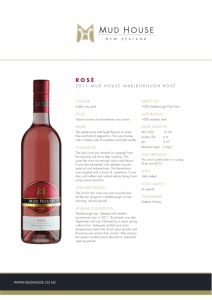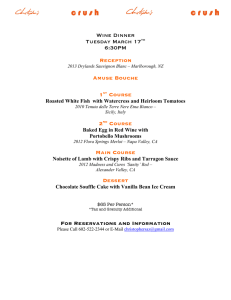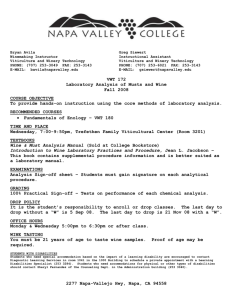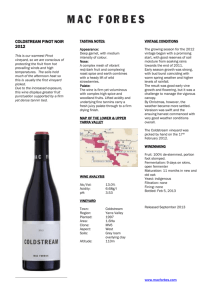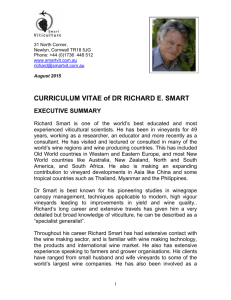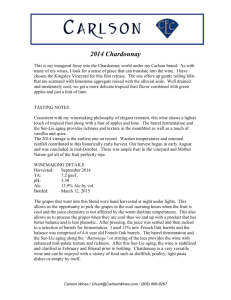course outline
advertisement
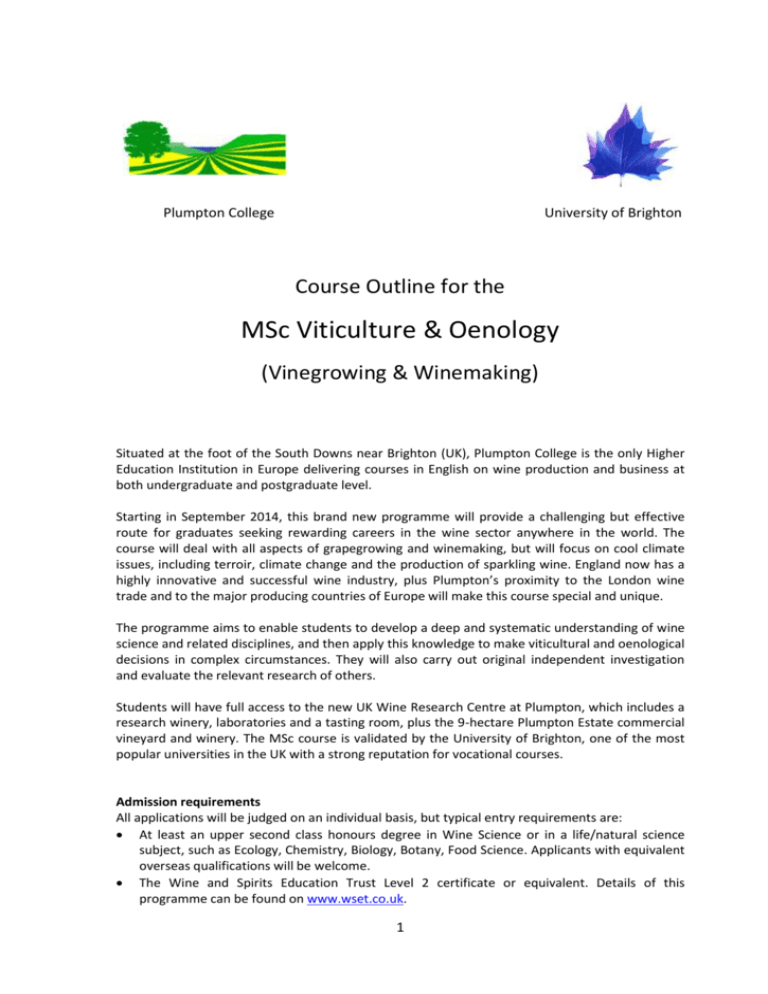
Plumpton College University of Brighton Course Outline for the MSc Viticulture & Oenology (Vinegrowing & Winemaking) Situated at the foot of the South Downs near Brighton (UK), Plumpton College is the only Higher Education Institution in Europe delivering courses in English on wine production and business at both undergraduate and postgraduate level. Starting in September 2014, this brand new programme will provide a challenging but effective route for graduates seeking rewarding careers in the wine sector anywhere in the world. The course will deal with all aspects of grapegrowing and winemaking, but will focus on cool climate issues, including terroir, climate change and the production of sparkling wine. England now has a highly innovative and successful wine industry, plus Plumpton’s proximity to the London wine trade and to the major producing countries of Europe will make this course special and unique. The programme aims to enable students to develop a deep and systematic understanding of wine science and related disciplines, and then apply this knowledge to make viticultural and oenological decisions in complex circumstances. They will also carry out original independent investigation and evaluate the relevant research of others. Students will have full access to the new UK Wine Research Centre at Plumpton, which includes a research winery, laboratories and a tasting room, plus the 9-hectare Plumpton Estate commercial vineyard and winery. The MSc course is validated by the University of Brighton, one of the most popular universities in the UK with a strong reputation for vocational courses. Admission requirements All applications will be judged on an individual basis, but typical entry requirements are: At least an upper second class honours degree in Wine Science or in a life/natural science subject, such as Ecology, Chemistry, Biology, Botany, Food Science. Applicants with equivalent overseas qualifications will be welcome. The Wine and Spirits Education Trust Level 2 certificate or equivalent. Details of this programme can be found on www.wset.co.uk. 1 Applicants will be interviewed at the College, or via an internet-based video link. Applicants from courses other than the BSc (Hons) Viticulture & Oenology course at Plumpton College will normally be required to complete two one-week intensive principles of vinegrowing and winemaking at the start MSc. If English is not the applicant's first language, applicants will be required to demonstrate proficiency in English by obtaining an overall IELTS score of 6.5 (with no component lower than 6 and with a 6.5 in writing). Students with relevant industrial experience, but without the minimum academic qualifications, may be eligible for entry, as long as they are able to show an ability to benefit from the course. This will be assessed at interview using portfolio evidence and employer references. Applications for the MSc Viticulture & Oenology must be made directly to Plumpton College via forms available on the website www.plumpton.ac.uk. Progression This MSc has been designed for those wishing to progress on to careers such as Vineyard Manager, Viticultural Consultant (e.g. soil management & pest control), Winemaker and Wine Quality Controller for the wine trade, and will also give the opportunity to continue post-graduate education towards the achievement of a Doctor of Philosophy (PhD) qualification in related subjects. There is a high demand for these skills, not just in the UK, but also in emerging wineproducing countries such as China, Turkey and India, who are seeking staff with a truly international approach to the subject and a strong understanding of the requirements of international markets like the UK. Course fees Fees for the MSc Viticulture & Oenology will be: UK/EU (Full Time) £5,950 Island Students (Full Time) £9,700 International (Full Time) £13,350 Part-time students will pay a proportion of these fees, according to the number of modules taken. Plumpton College BSc (Hons) Viticulture & Oenology graduates will receive a 10% discount on their fees. Bench fees may apply, but these have been waived for 2014/15 entry. Course equipment requirements and study trips All students will need to purchase: A set of 6 wine tasting glasses (preferably of ISO (International Standards Organisation) or INAO design). These can be purchased directly from the College. Work overalls, boots and a laboratory coat Some key text-books There will be two compulsory study trips of about 5 days each in semester 2 in order to provide students with an experience of other wine-producing regions. The cost of transport and accommodation will be covered within the course fees, while other costs (e.g. food) will be selffunded. 2 The Wine Department at Plumpton College also offers short trips to regions such as Bordeaux and Montpellier, which will be made available to MSc students. Course structure The course is planned to be flexible in its delivery in order to meet the needs of the widest possible range of students. Students without the BSc in Viticulture and Oenology from Plumpton College will be required to attend a two-week intensive course in vinegrowing and winemaking prior to commencing this programme. The MSc programme is available on either a full-time (3 semesters, 15 months) or a part-time (6 semesters over 3 years) basis. The teaching year starts in the last week of September, and is organised into two semesters, each one of approximately 15 weeks’ duration with three weeks for Christmas and Easter and a threeweek inter-semestrial break in February. The MSc Viticulture &Oenology has a third semester, which extends from the start of July to the end of December, in order to allow students to complete their Masters project. The course is comprised of modules with credit values at level 7. These credit values are in multiples of 20, with 20 credits being equivalent to 200 hours of student effort, including both taught sessions and individual study. Normally, a 20-credit module will attract 3 hours of tuition a week. Lectures are from 9 a.m. to 5 p.m. on weekdays, but there will be some intensive periods of study and some study trips. If studied full-time, modules to a total of 180 credits at level 7 must be completed in 15 months to complete the MSc. The course has three intermediate exit awards and a final award: A Post-graduate Certificate in Wine Science, for students successfully completing a total of 60 credits selected from semesters 1 and 2. A Post-graduate Certificate in Viticulture & Oenology, for students successfully completing the three 20-credit modules from semester 1. A Post-graduate Diploma in Viticulture & Oenology, for students successfully completing the 120-credit modules from semesters 1 and 2. A Masters Degree in Viticulture & Oenology, for students obtaining 180 credits and successfully conducting the 60-credits Master project in semester 3. Module codes Status* Module Title Semester taught Credit value PWM001 C The science and application of grapevine biology 1 20 PWM002 C Grape berry and wine composition & analysis 1 20 PWM003 C The science and application of winemaking 1 20 PWM004 C Climate & terroir 2 20 PWM005 C The science of sparkling wine 2 20 PWM006 O Independent study 2 20 PWM007 O Research methods for viticulture & oenology 2 20 3 PWM008 C Masters project 3 60 *C = Compulsory; O = Optional The first semester comprises of three modules which enable students to gain and apply knowledge and understanding of current research in grapevine physiology, sustainable viticulture, grape and wine composition and analysis, wine chemistry, biochemistry, and microbiology. The second semester focuses on climate & terroir and sparkling wine. Students wishing to complete with the Post-Graduate Diploma in Viticulture & Oenology may elect to complete a dissertation and end their studies at this point. Students who intend to study for the full Masters degree will normally take an in-depth research methods module prior to commencing their Masters project. Students engage with their Masters Research Project module in the final semester, which can be completed in our new Wine Research Centre, or in another suitable location, such as in the laboratory of a well-equipped commercial winery. Students will also have access to workshops and masterclasses offered through the WineSkills project (see www.wineskills.co.uk ) and can attend undergraduate teaching sessions on specific subjects (such as winter pruning or sensory evaluation) to support their learning. For part-time students, the course may be completed in 6 semesters. In the first year of study, students will attend to one module in semester 1 and two modules in semester 2. In semester 1 of year 2, students will attend two modules, then either PWM006 or PWM007 in semester 2, while the Masters Project module will be conducted in the final semester, as described in the table below. Semester 1 Year 1 Year 2 PWM001 Semester 2 Semester 3 PWM004 & PWM005 No teaching ½ day teaching/week* ½ day teaching/week + 2x 1-week study tours PWM002 & PWM003 PWM006 or PWM007 PWM008 1 day teaching/week + group-work at harvest Max. ½ day teaching/week 20 hours of tutorials and seminars * Note that the teaching loads stated on this table may vary according to the season, and that students are expected to spend at least 200 hours on each module (600 hours on PWM008) 4 Summary of Modules PMW001 - The science and application of grapevine biology (compulsory) Through an intensive period of study (including laboratory work), students will gain an in-depth, critical understanding of grapevine physiology and its relations with the environment. They will study best practice in vineyard management and explore a specialist area of viticulture. Finally, working in groups, the knowledge gained in this module will be used to evaluate and make recommendations in a commercial vineyard environment through a case study exercise. The module will be delivered by weekly session of lectures, workshops, practicals, visits or seminars. PMW002 - Grape berry and wine composition & analysis (compulsory) Through weekly lectures and intensive laboratory practical sessions, students will achieve an indepth knowledge of grape berry and wine composition, including the methods and techniques required for their analysis. Students will also be responsible for a winemaking project which will involve extensive group work during the vintage period as required. They will then be able to apply their knowledge to inform decision-making in research and commercial environments. PMW003 - The science and application of winemaking (compulsory) Through weekly seminars and workshops, students will develop a critical understanding of the current and emerging knowledge in different aspects of wine science. Students will also be able to apply advanced wine science knowledge to evaluate the options used by winemakers to manage the individual processing steps to produce wines with specific styles in commercial environments. PMW004 - Climate & terroir (compulsory) Through a series of preparation sessions followed by workshops and a field trip, students will examine key relationships between site, climate, viticulture and winemaking to enable them to contextualise the implications of climate change scenarios and their impacts on terroir, grape and wine production. PMW005 - The science of sparkling wine (compulsory) Through weekly taught sessions and a field trip, students will gain an in-depth, systematic understanding of the key steps involved in the production of sparkling wines. It will enable them to take informed decisions on the production of sparkling wines, from vineyard planning, through grape production, winemaking to the sensory evaluation of this style of wine. PMW006 - Independent study (optional) The student will negotiate the outcomes for this module with the module leader, then, through independent study, investigate an appropriate aspect of viticulture and oenology. PMW007 - Research methods for viticulture & oenology (optional) This module will provide students with an in-depth understanding of the statistical methodology and different research approaches required for conducting research in the field of viticulture and oenology. Following a survey of relevant literature, students will then select a researchable topic and plan an investigation to address significant areas of theory or practice within the field of viticulture & oenology. PMW008 - Masters project (compulsory) To provide students with the opportunity to undertake an in-depth investigative research project in an appropriate topic in viticulture and oenology. 5 The course team Plumpton College has been delivering courses in Wine Production since 1988 and has a wellqualified and experienced teaching team to deliver the MSc: Dr Matteo Marangon, will lead the MSc Viticulture & Oenology programme. He completed his studies at Padova University in Italy, but has been working as a researcher for the Australian Wine Research Institute for the last five years. Chris Foss, Head of Wine Department and Course Leader for the Foundation Degree in Wine Production course, is half-French and Bordeaux-trained. He has worked in the French wine industry in the Entre-deux-mers, St-Emilion and Sauternes and has visited most winemaking regions in the world. Tony Milanowski is the Lecturer in Oenology and Course Leader for the BSc (Hons) Viticulture & Oenology course. Tony has a BSc in Chemical Engineering plus a Graduate Diploma in Viticulture & Oenology from Adelaide University. He has made wine with Katnook (Wingara), Renmano & Berri Estates (BRL Hardy) and completed three vintages in Italy. Andrew Atkinson, Lecturer in Wine Production, Statistics & Research Methods. Andrew initially studied Computer Science but then graduated from Plumpton with the FdSc Wine Production and WSET Diploma. He is currently completing an MRes in Bioscience at the University of Brighton, with research focused on wine microbiology. Alistair Nesbitt, part-time Lecturer and Wine Industry Researcher, attained a First Class Degree in Viticulture and Oenology at Plumpton College, and has a Master’s Degree in Bioscience. He is currently completing a PhD in climate and viticulture at the University of East Anglia. General Booklist Latest editions of: Boulton, R B et al - Principles and practices of winemaking. Aspen publishers Creasy, GL and Creasy, LL - Grapes, Cabi Publishing Galet P - General Viticulture, Oenoplurimedia Iland P et al – The grapevine: from the science to the practice of growing vines for wine Iland P et al - Monitoring the winemaking process from grapes to wines: Techniques and concepts. Patrick Iland Wine Promotions. Iland P et al - Chemical analysis of grapes and wine: techniques and concepts Patrick Iland Wine Promotions. Iland P et al - Microbiological analysis of grapes and wine: techniques and concepts Patrick Iland Wine Promotions. Jackson RS - Wine tasting: a professional handbook, Academic Press Keller M - The Science of Grapevines – Anatomy & Physiology, Elsevier Science & Technology Riberau-Gayon P et al - Handbook of Enology, Vol. 1: The microbiology of wine and vinifications, Vol. 2: The chemistry of wine stabilisation and treatments John Wiley & Sons 6 Former student destinations Graduates from Plumpton College can be found in all sectors of the wine industry and throughout the world. Here are where some of them have ended up: Victoria Ash: Assistant Winemaker, Hush Heath Vineyard, UK Andrew Baker: Chief Buyer, Virgin Wines On-line Simon Barker: Winemaker, Barker’s Marque Estate, Marlborough, New Zealand Mark Barnes: Vineyard Manager, Chilford Hall Vineyard, UK Max Birch: Winemaker, Quinta do Miradouro, Algarve, Portugal. Jon Bowen: Vineyard Owner/Manager, Minervois, France Richard Case: Owner/Manager of Domaine de la Pertuisane, Rousillon. Jim Close: Winemaker, Source Napa Winery, California, USA. Simon Coulshaw: Owner/Manager, Domaine des Trinités, Faugères, France Jonathan Coulthard: Vineyard Owner/Manager, Cote de Duras, France. Hugh Crighton: Assistant Winemaker, Vidal Estates, NZ Josh Donaghay-Spire: Winemaker, Chapel Down Winery, UK Robert Doyle: Vineyard Manager, Domaine de la Pertuisane, France Kristy Dunn: Liquid Developer, Diageo plc, UK Owen Elias: Winemaking Consultant, UK Stephen Farquharson: Wine Importer & Vineyard Owner/Manager, Central Otago, NZ. Graham Fisher: Vineyard Manager, Bride Valley Vineyard, UK Patrick Fuchs: Cellarmaster, Spitalweingut Kiefer, Baden, Germany Darcy Gander & James Dodson: Vine-Works vineyard contractors, UK Hugh Girling: Winemaker, Marlborough Vintners, NZ Nick Hall: Vineyard Manager, Herbert’s Hall Vineyard, UK Charlie Holland: Winemaker, Gusbourne Wine Estate, UK Carol Howard: Purchasing & Logistics, Bibendum Wines Liam Idzikowski: Winemaker, Langham Vineyard, UK Mike Jones: Winemaker, Gentilini, Greece David Main: Winemaker, Hunter Wine Services, Australia Alex Mills: Winemaker, Pebblebed Vineyards, UK Rupert Nicholson: Director, Carte Blanche Wines, UK Sue Osgood: Vineyard Manager, Bolney Wine Estate, UK Xenofon Panayiotou: Government Inspector of Vineyards and Wineries, Cyprus Nicholas Pead: International Development Team, WSET, UK Tom Platt: National Accounts Manager, Liberty Wines, UK Jon Pollard: Vineyard Manager, Gusbourne Vineyard, UK Emma Rice: Director/Oenologist, Custom Crush UK Ltd Mike Roberts: Manager/Founder, Ridgeview Vineyards Simon Roberts: Winemaker, Ridgeview Vineyards Sandy Robertson: Enologist, Merry Edwards Wines, California, UK John Seccombe: Winemaker, Iona Vineyards, South Africa Tersina Shieh: General Manager, Independent Wine Centre, Hong Kong Simon Spencer: Consultant Winemaker, Vancouver Island, Canada Matthew Strugnell: Vineyard Manager, Ridgeview Vineyard, UK Dermot Sugrue: Winemaker, Wiston Estate Vineyard, UK Liam Tinston: Winemaker, Three Choirs Vineyard, UK Jean-Philippe Tytgadt: Wine Importer, Belgium Robin Williamson: Vineyard Owner/Manager, Languedoc, France Andrew Wood: Assistant Winemaker, Kangarilla rd, McLaren Vale, Australia Simon Woodhead: Vineyard owner/Manager, Stopham Vineyard, UK Paul Woodrow-Hill: Vineyard Consultant, UK 7 For further information on the MSc Viticulture & Oenology at Plumpton College, see www.plumpton.ac.uk Email Admissions at Plumpton on admissions@plumpton.ac.uk Contact the Course Leader, Matteo Marangon on matteo.marangon@plumpton.ac.uk Telephone Plumpton College on +44 1273 890454 Write to: The Admissions Office Plumpton College Ditchling road Nr Lewes East Sussex BN7 3AE United Kingdom June 2014 8
